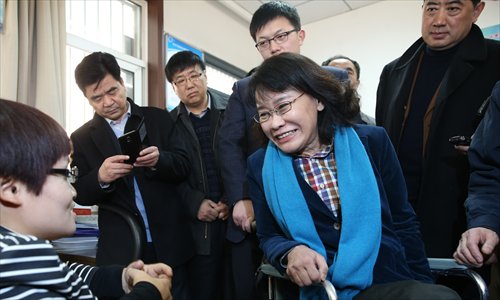
Zhang Haidi(right) meets a woman who looks up to her and regards her as idol.
In October , a Chinese woman will become the new president of Rehabilitation International (RI) , a global organization that empowers people with disabilities and provides sustainable solutions towards achieving a more inclusive society for them.
Zhang Haidi , the current chair of the China Disabled Persons' Federation (CDPF) , is a well-known figure in the country. Elementary school children can read about her story in their textbooks. In the 1980s , she became a national hero and symbol of tenacity and proactivity.
Right now , Zhang is in Rio de Janeiro , Brazil , attending the Paralympic Games as chairman of the Chinese representatives. In October , she will begin her term at RI and start taking her campaign international.
Big in the 1980s
Zhang was born in Ji'nan , East China's Shandong Province in 1955. At the age of 5 , she contracted polio , which left her paralyzed from the waist down after four operations to remove tumors from her spine.
Because of her disability , Zhang was unable to attend school , but taught herself to university level and mastered several foreign languages , including German , English , Japanese and Esperanto. She then became a translator and writer.
Because of her determination to face life's frustrations staunchly despite being disabled , she was held as a role model by the Communist Party of China (CPC) for the country's youth in the 1980s.
She toured the country giving inspirational speeches about her experiences , which turned her into a national celebrity. The CPC started a national campaign to promote Zhang among the young people.
She was regarded as the "Lei Feng of the 1980s" and "China's Pavel Korchagin."
Lei Feng was a Chinese soldier and a national role model renowned for his selflessness. Pavel Korchagin is the leading character in the Russian novel How the Steel Was Tempered, one of the most popular novels in China , which mostly affected the generations of the 1950s and 1960s.
Zhang started working in 1981. A year later , she joined the CPC. That year , she married Wang Zuoliang , a teacher at Shandong Normal University.
In the Chinese talk show A Date with Lu Yu , Zhang said what happened in those days was like a "dream."
"It feels like it all happened to someone else , not to me ," she said.
Zhang said in the show that she lived a rather restless life back then , receiving tons of letters and dozens of visitors every day.
"There have always been whole pages covering Haidi's stories and what has happened to her in the media… It was only in 1986 that this heat gradually faded ," she said.
She recalled that after the attention paid to her subsided , she found more time to focus on her work.
"As an individual , I need to keep a clear mind. As I chose to be a writer , I should work behind the curtains , not on the stage ," she said.
Zhang has made great achievements both as a writer and a translator. She has published several books including Beautiful English in English and Chinese and translated a slew of foreign literary works , including Ralph Helfer's Modoc : The True Story of the Greatest Elephant that Ever Lived.
For the disabled
In 2008 , she became the chair of the CDPF and was reelected in 2013. She also became a member of the National Committee of the Chinese People's Political Consultative Conference (CPPCC).
She has widely used her status and fame to push for greater attention and improvement of rights for people with disabilities. She repeatedly called for the improvement of access to buildings and campaigned for the right for people with disabilities to drive.
Since 1999 , she has continuously submitted proposals as a CPPCC member to the central government on allowing people with disabilities to drive and developing cars for this group. She has also learned how to drive herself , with a modified car.
In 2010 , the government finally developed a new policy , allowing some people with disabilities to obtain driving licenses.
In addition to this work , Zhang often gets involved in publicity campaigns about the difficulties people with disabilities face , such as not being able to get public transportation , toilet inconveniences , or sidewalks for the blind.
During her term , government measures towards people with disabilities also improved. According to a report released by the State Council in 2015 , in the last few years , more than 10 million people with disabilities have received rehabilitation. In 2015 , more than 20 million received benefits from the government. Also that year , more than 8 ,500 people with disabilities were admitted to universities and 1.56 million obtained jobs.
In interviews , Zhang said that she wants to do more for people with disabilities in the future.
"RI isn't about my identity , and it isn't about a Chinese being president ," she told China News.
"The most important thing is how to provide better help and facilities for hundreds of thousands of people with disabilities. We've done quite a lot in China , and we hope to take that to the world stage."

